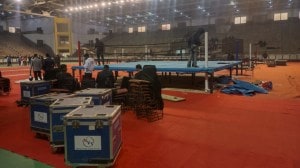In Punjab, why BJP has been accused of ‘interference in Sikh affairs’
Both the SGPC and BJP’s former ally Akali Dal have targeted it after it inducted over 1,000 Sikh leaders in Delhi, with Akali chief Sukhbir Singh Badal alleging that the party is trying to “weaken all Sikh institutions”.
 SGPC chief Harjinder Singh Dhami (Express Archives)
SGPC chief Harjinder Singh Dhami (Express Archives)As the BJP increasingly looks to expand in Punjab and grow out of its image of being an urban Hindu party, it is increasingly likely that it will come in conflict with its former ally Shiromani Akali Dal (SAD) and the Sikh religious establishment on which the Akalis have a hold.
The latest sign came over the weekend as more than 1,000 Sikh leaders, including six elected members of the Delhi Sikh Gurdwara Management Committee (DSGMC) and a former member, joined the BJP in Delhi on Saturday. This immediately drew a swift response from the Shiromani Gurdwara Parbandhak Committee (SGPC), the national apex body of Sikhs that oversees gurdwara management.
The SGPC — the Badal family that runs the SAD is said to have had a great degree of control on the organisation and its top posts over the decades — accused the BJP of interfering in religious affairs and demanded that the new inductees resign from the DSGMC. SGPC chief Harjinder Singh Dhami on Saturday said the BJP was on a path of “direct interference in Sikh affairs, which the Sikh community will never accept”.
“The members of the Sikh organisation are elected by the sangat (community) with the confidence that they will act according to the religious sentiments and traditions. But when the members join a party with anti-Sikh ideology, it is natural that the sentiments of the sangat will get hurt,” Dhami said.
The BJP’s move to induct such a large number of Sikh leaders serves the purpose of its immediate goal of dealing the INDIA bloc a blow in Sikh-dominated areas in Delhi Lok Sabha constituencies such as West Delhi, North East Delhi, and Chandni Chowk. It also sends a message to the Sikh community in Punjab that the party has been reaching out to after the hit it has taken over farm protests in recent years. But, a BJP expansion in Punjab is not music to its former ally’s ears as the Akalis always got the rural votes during their alliance of over two decades and getting that back is the key if it has to revive.
SAD president Sukhbir Singh Badal on Tuesday criticised the induction of the DSGMC members. “Be it the DSGMC, HSGPC (in Haryana) or the management boards of our Takht Sahibans, this party has been putting in its best to weaken all Sikh institutions. The community well understands all the tactics this national party is using. I am confident that Punjabis in general and Sikhs in particular will completely reject the saffron party in the Lok Sabha elections,” Badal said.
In February, Badal criticised the move of the Maharashtra government, of which the BJP is a part, to reconstitute the Shri Hazur Sahib Management Board. In a letter to the PM, he reminded that one of the key commitments that the Union government made after Independence was that it would not interfere in Sikh religious affairs without the prior approval of a two-thirds majority of the SGPC.
Former DSGMC president Paramjit Singh Sarna said the BJP would not benefit by inducting such a large number of Sikhs into the party. “If by doing so, they feel they can please the Sikh voters, they are mistaken… If Punjab voters are angry with them… so are the voters outside Punjab,” he said.
However, BJP National Executive Committee member Harjeet Singh Grewal criticised Dhami’s statement, questioning his affiliation with the Akali Dal. “Dhami himself should first answer as to what interests he has with the SAD,” Grewal said.
The BJP leader said Dhami was in no position to demand the DSGMC members’ resignation. “If Dhami did not speak out against Sikhs joining the Congress, a party linked to the Sikh massacre, then why is he giving threatening advice to those who join the BJP?” he said, adding that the Khalsa Panth does not limit what party Sikhs can join.
As part of the Central government’s Sikh outreach, over the past few months, National Commission for Minorities chairperson Iqbal Singh Lalpura has addressed several meetings with people affected by the 1984 anti-Sikh riots. They account for more than two lakh voters in Ludhiana, Mohali, Amritsar, and Patiala, according to some estimates. The BJP has also named several Sikh faces in its Punjab executive committee, including former MLAs Fateh Jung Bajwa and Kewal Singh Dhillon, and former Khadi Board chief Harjeet Singh Grewal.
However, the party continues to face stiff resistance in rural areas where farmer unions are against them. In some instances, BJP leaders have also been forced to change their routes to reach campaign venues. To counter this problem, the BJP is now focusing more on its grassroots-level campaigning and has also started setting up village-level committees. The party has instructed its booth-level workers to hold one-on-one “chai pe charcha (conversations over cups of tea)” meetings in villages.
- 01
- 02
- 03
- 04
- 05






























